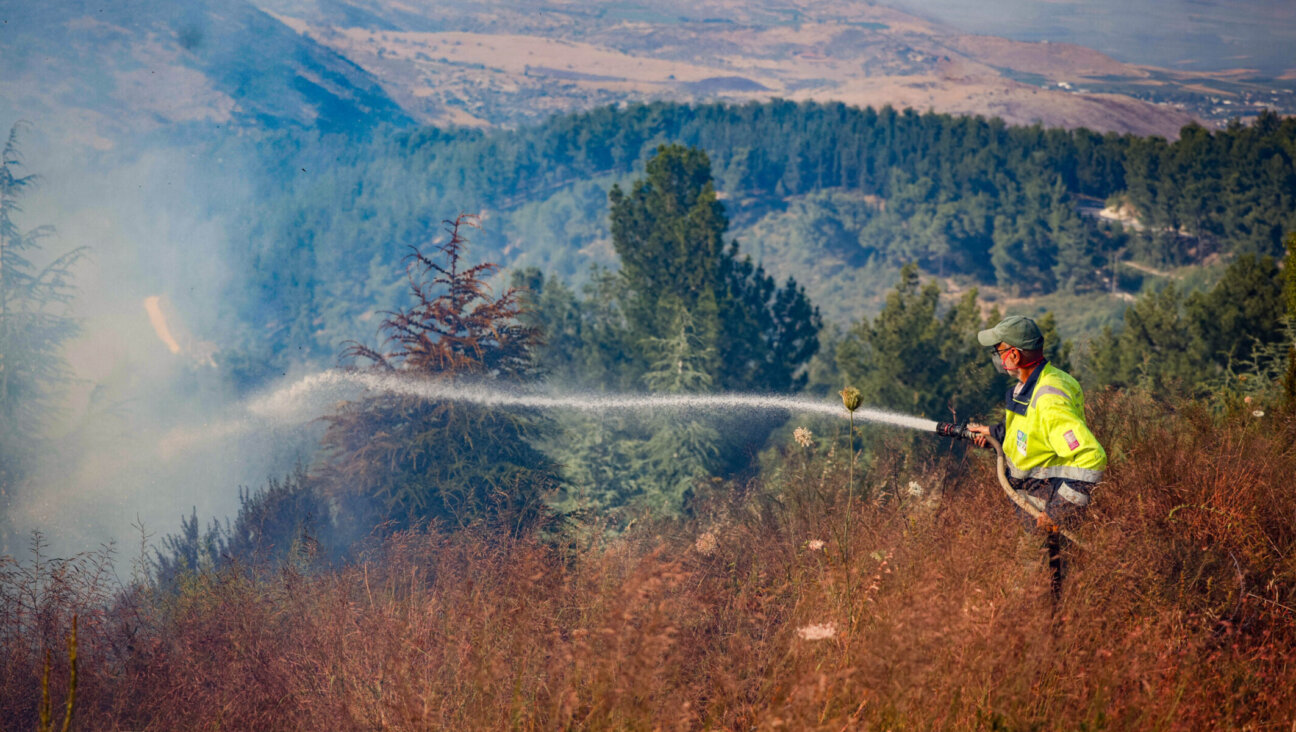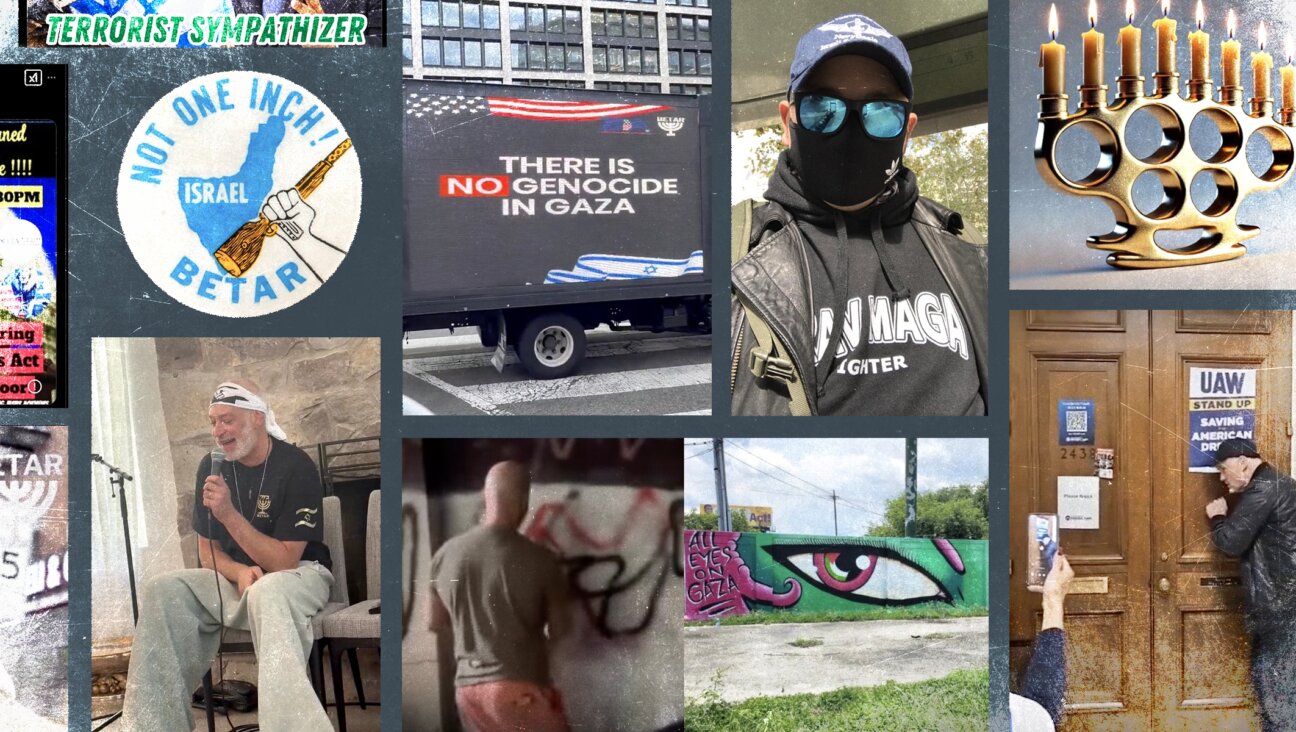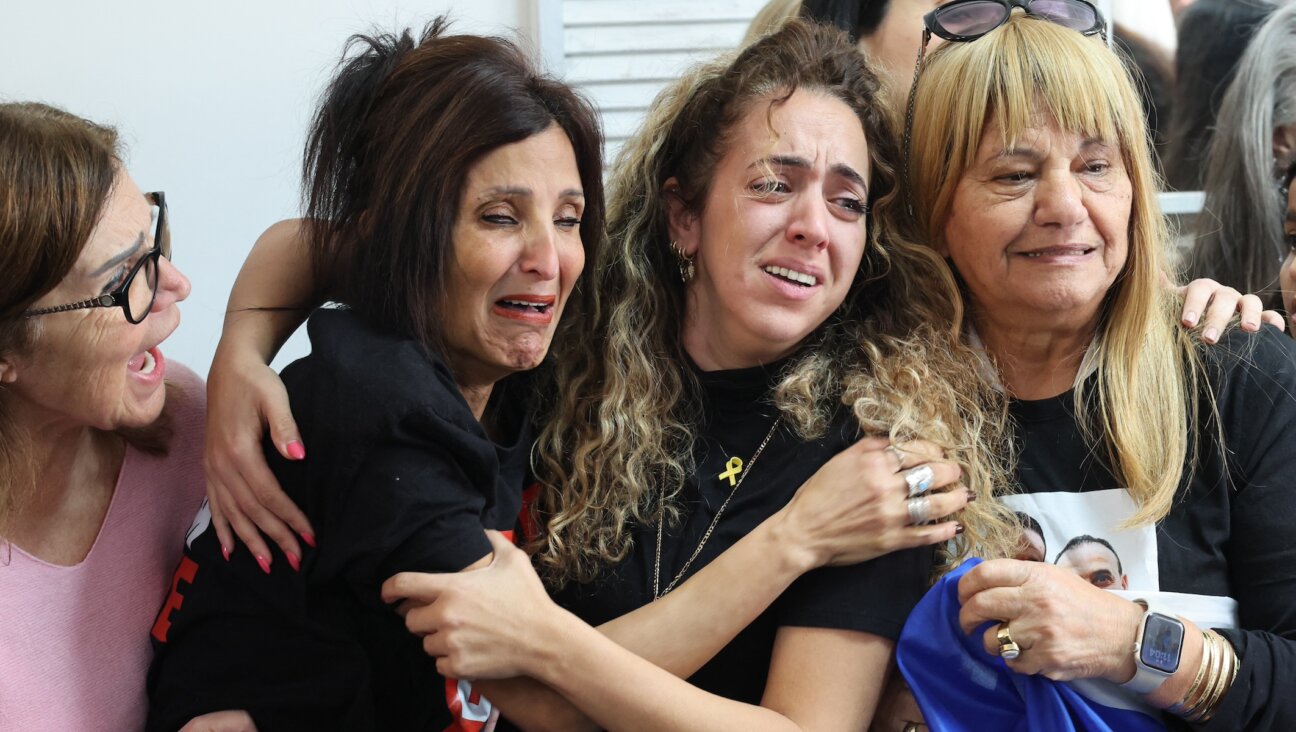‘We don’t have time to prepare for Passover’: An interview with a rabbi in Kyiv

Refugees from the city of Chernihiv in north central Ukraine found shelter in the Brodsky Synagogue in Kyiv on March 18, 2022. Photo by Tim Judah
Helen Chervitz is a fashion writer in Kyiv, but since the Russian invasion, has been writing about living in a country at war. In her first piece for the Forward, Chervitz interviews Rabbi Reuven Azman about his efforts to aid refugees who have streamed to Kyiv from parts of the country hard hit by Russian shells and missiles.

Rabbi Reuven Azman at the Brodsky Synagogue in Kyiv. Photo by Tim Judah
Chervitz is a Jewish American, but also a native Ukrainian. She, her husband, and young daughter immigrated to the U.S. in 1988 to escape antisemitism and lived in New York and Boston. For her husband’s business, they moved back to Ukraine 10 years ago. In the post-Soviet era, Ukrainians enjoyed freedom, and antisemitism was no longer a daily worry.
Half of Kyiv’s 4 million residents have fled in the past few weeks. Chervitz stays to find food for elderly neighbors too scared to leave their apartments and to tutor children whose schools are closed.
It took her three attempts to meet with Azman — one of two men who call themselves the chief rabbi of Ukraine — at Kyiv’s Brodsky Synagogue. She was greeted on April 1 by three guards wearing Kalashnikovs like backpacks. As she approached, one moved the machine gun to the front of his body. She said she knows they were Jewish because later that evening, after she proved she was not a threat, she heard one of them help another visitor recite the blessing over Shabbat candles.
Azman he agreed to meet with Chervitz for five minutes, but then spoke with her -– in English and in Russian –- for an hour. This interview has been edited for length and clarity.
What is the Brodsky Synagogue’s mission in this war?
We’re trying to save people. Not only here, in Kyiv, but also in Chernihiv, Kharkiv, Mariupol and other towns. We help people to escape from dangerous places. My friend Garik Logvinsky, a member of our congregation, a former member of the Ukrainian Parliament, is helping our synagogue to organize buses and involve the police for security reasons.
On March 18, the synagogue hosted more than 300 evacuees – Jews and non-Jews – who arrived from embattled Chernihiv, 90 miles northeast of Kyiv, in a column of vans and cars. They were all dazed and traumatized. Some of them couldn’t walk and were taken by ambulance. We welcomed them, fed and arranged places for them to sleep. And in the morning, after prayers, we started organizing to get them to their next destinations — many to the border with Moldova.

The Brodsky Synagogue in Kyiv. Photo by Helen Chervitz
What else are you doing besides helping people to escape?
We’re providing humanitarian aid –- delivering food and medications to old people. Many of them live alone. Some are bedridden and we find volunteers who can be caregivers. We buy whatever else they need and bring it to their homes. And not only in Kyiv, but we also have groups of volunteers who work in Mariupol and other cities. This is so dangerous. And we go by our cars to those cities and try to bring people here. We also cook 1,000 meals a day for those in need. Not here, in the synagogue, but at different places around the city, and then distribute them, to people both Jewish and non-Jewish. It’s professional cooking. I pay for it.
Where do you get the money to fund these efforts?
I helped two hundred people using my personal bank account. At least a thousand people ask for money every day because they don’t have any and have nothing to eat. But we can only help hundreds. I don’t know who those people are but if they ask, I send the minimum of 1,000 hryvnias (the equivalent of about $30.) Now the bank blocked my card saying it’s too much. Some money is coming from small charities or individuals, but very little money.
I also borrow money from people who escaped abroad. Not many people, but just my wealthy friends. They were allowed to take only $10,000 with them. Also, I have to pay in cash –- for buses, cooking meals, and so on. I have a little money from some charities. One charity donated half a million dollars but I have not received it yet. But it’s not a lot of money considering that I organize 20 buses a day, and each bus costs from $10,000 to $20,000, and sometimes it’s more when I have to rescue people from places where people are running for their lives. I’m not rich and I have to pay back the money I have borrowed.
Are Jewish Ukrainians at particular risk?
Yes, we are trying to provide more security in different places. Anatevka, near Kyiv, the Jewish town that I built, is one of those places. I founded a village for Jewish families displaced by Russia’s eight-year war against Ukraine in the eastern Donbas region. I named it Anatevka, after the village from “Fiddler on the Roof.” During the first two weeks, hundreds of Jewish people were coming to Anatevka and we evacuated them from there. But there were tanks and constant bombing around Anatevka.
Do you think Anatevka was targeted by the Russian Army because it is a Jewish town?
I don’t know if it was targeted because it is Jewish. The areas close to Babyn Yar, Drobytsky Yar, Kharkiv Synagogue and the Jewish cemetery in Bila Tserkva were heavily bombed. I heard a lot of heartbreaking stories from people who ran from dangerous places and I myself saw a lot of horrible things because Anatevka is close to Irpin. (Note: Irpin, a Kyiv suburb, is one of the places where Russia is accused of mass killings of civilians.)
How are you preparing for Passover?
We don’t have time to prepare for Passover because all our volunteers work day and night to save people. I know that organizations sent matzo and kosher food for Passover. We will certainly organize a traditional Passover Seder. Every Friday 20 to 30 people come for Sabbath. I think more people will come to the synagogue for a Seder. But people are afraid to stay late and then commute because of the curfew. We will organize and bring boxes with everything that is needed for a Seder to people’s homes. And not only in Kyiv but in other towns as well. There are many Jewish people who escaped to safety in Western Ukraine. They will be sending food to dangerous but not life-threatening places in Eastern Ukraine, like Dnipro. We will help each other.
Get the Forward delivered to your inbox. Sign up here to receive our essential morning briefing of American Jewish news and conversation, the afternoon’s top headlines and best reads, and a weekly letter from our editor-in-chief.
Do you get donations from American Jewish organizations or individuals?
I know many Jewish organizations collect money in America, but I don’t know where it is and where it is going. Some of those organizations use our information, videos and pictures but where the money goes, I don’t know. For us, it costs a lot of money to provide all the support. I keep borrowing the money.
Do you get any help from Ukrainians?
We don’t need their support. We support them. For example, I brought first-aid kits from Israel and we gave them to people. The world tries to help Ukraine but many Ukrainian people still have nothing. And when I see today, as I do every day, a Ukrainian town under attack, I help them. I’m not a millionaire, but I have to give money to those in need.
Where were you when the war broke out? Why did you stay in Ukraine?
I was in Anatevka. We have a hotel there and a school. So we could take in hundreds of people who were fleeing the war. I know it’s important for me to stay. People think, “Oh, the rabbi is here, we are protected and everything will be all right.” I keep posting encouraging videos. I evacuated my family to Israel. But I was no longer afraid when they left. I am where I am supposed to be. I am needed here to help people and to raise their spirits. What would be the message if the rabbi left? I am not leaving.
What is your message to Russian Jews?
I have been warning Russian Jews that their silence would be their shame forever. (Azman then switched from English to Russian) I was born in Russia, I went to school there, and I have many friends in Russia who are silent. Not even in my worst nightmare, could I imagine I have to perish in the war against Russia.
What is your view of Israel’s action since the war began?
I’m embarrassed by Israel’s attitude. I think Israel has done a lot of things that are not right. They are not sufficiently tough in their reaction to the Russian invasion and aggression. I signed a letter with 80 more prominent Jews to rectify the situation regarding the visa-free agreement between the two countries. I asked Israel for the Iron Dome air defense system but they refused.
Thank you very much for your time.
If you need more information, please come again. But be careful when you get to the synagogue. I have reinforced security here because I feel I’m putting my life at risk.
A message from our Publisher & CEO Rachel Fishman Feddersen

I hope you appreciated this article. Before you go, I’d like to ask you to please support the Forward’s award-winning, nonprofit journalism so that we can be prepared for whatever news 2025 brings.
At a time when other newsrooms are closing or cutting back, the Forward has removed its paywall and invested additional resources to report on the ground from Israel and around the U.S. on the impact of the war, rising antisemitism and polarized discourse.
Readers like you make it all possible. Support our work by becoming a Forward Member and connect with our journalism and your community.
— Rachel Fishman Feddersen, Publisher and CEO





























